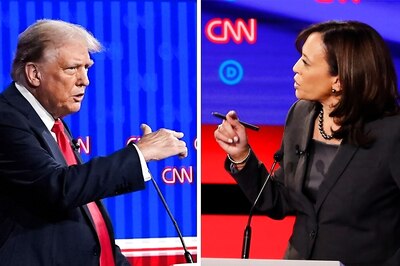
views
New Delhi: India's next big economic goals aim at fast implementation of electric vehicles (EV), Bharat Standard (BS)-VI and tapping the vast potential of artificial intelligence (AI). In a conversation with News18, Mansi Madan Tripathy, Managing Director, Shell Lubricants, India, talks about all three highlighting the importance of AI in business management and the fact the India is going through an evolution in terms of jobs.
Here are the edited excerpts from the interview:
Q: Is India's slow progress in electric vehicles a hidden advantage for Shell?
A: I think we are all for electric vehicles in terms of a larger economic agenda because it's good for the society and we fully support the movement. I think electric vehicles are a trend for a larger business.
The cars segment per se or even for that matter lubricants is small versus our overall business because we have almost 50 percent B2B business and then we have commercial vehicles and we have bikes and so on and so forth. So in that larger gamut of things while cars are extremely important, it's about 25 percent of the total lubricants. It's still not a hundred percent.
Third, I think what we believe is that we are in the business of friction- free movement. Be it machines, be it cars, or scooters lubricants play a vital role. Tomorrow, that solution can be through lot of data analytics. So, for example, if it is an electric vehicle car, you could be real time monitoring the frictions in the whole machine and guiding the driver in terms of how best to drive your car so that it's more energy efficient per se because in that kind you have to be more energy efficient. If you put that mindset then even this movement, you know, if you, say, okay, I'm in the business of friction less movement. Then this again becomes like a clear opportunity.
I think it's a matter of the rate at which it precipitates which still has dependencies on some of the infrastructure costing as well as the raw material availability. I think the technology's pretty much there and consumer acceptance at the end of the day with a price point. I think it's a trend which is inevitable, the rate and the level of conversion is the only question mark.
We are ready for any of those scenarios.
Q: Is Shell worried about artificial intelligence eating up jobs?
A: Not at all. We feel again it's an inevitable trend and for any of these trends there are new jobs, which get created. We have a very big operation cell because of the company's size. We track right from when a customer punches an order till the time the delivery is made. Earlier, we had a very big team which, now because of lot of AI and machine learning and Bots, we have been able to reduce. However, now we have added people because now we are getting such rich data that to do those analytics and give us insights in terms of how many consumers haven't bought it in the last X time frame, but were loyal customers before; so what kind of communication which needs to go to them or if a person is buying X and Y products they're most likely to buy Z as well.
So there's a lot of data now which are readily available in any filters and any content sizes and we can tell those but then we need the marketing intelligence to super-play that data to then make smarter decisions.
The point I'm making is that certain types of jobs keep decreasing and absolutely new set of jobs keep coming up.
This is like a continuous evolution where things will keep happening. I think the possibilities with machine learning are immense in terms of market intelligence, business decision-making or making yourself more efficient.
Q: Given the lack of colleges teaching AI, how does Shell trace its path as a recruiter?
A: The problem you're highlighting is a little bit definitely on a macro level. If you look at our education system and skilling system, they are not matching right now to the jobs which are needed. I think a lot of companies are building their own colleges where they are training.
There's a lot of these startups who are doing that kind of work which are matching skill needed to the institutions which are teaching and they are trying to match it. I'm very confident that the solutions will emerge as they go forward but I think the second part which is availability of talent if you're looking at smaller scale is present.
As Shell is very big it becomes easier for us to access information because somebody, maybe in North America, would have already found a way out. There is somebody who is ahead of us maybe by a year or two, so we are able to put them as mentors and then we are able to formulate a bigger and larger team and ensure that we are learning as well. Also, we get tons of consultants who keep coming and adding the much needed expertise to the system as well.
Q: How do lubricants change once BS-VI comes in?
A: Lubricants, as part of this whole ecosystem, are dependent on what the OEMs need. Because the logic behind this is a more sustainable and carbon-free technology. What happens is that your engines and everything becomes much smaller, which means that the level of heat, level of friction, which the liquid has to undertake increases and hence the role of the lubricant with the same amount of the liquid has to undergo a higher pressure and higher heat in that sense. The BS-VI technology, which we are working or we already have actually in most parts of the world and we are working with the OEMS, is then asking what are the other technology goals, along with BS-VI. And so for some OEMs it is a very high on fuel efficiency agenda or some OEMs it is for the carbon neutralization agenda, for some it is higher ODI, which is oil drill into well agenda, etc. What we are doing is we are sitting with them and mapping their technology road map in terms of beyond the basics of what a lubricant needs to do with that technology.
Q: How do you plan to take Shell to tier-II and tier-III cities?
A: I want to make it more like a passion choice rather than a compulsive choice. We really want to drive a lot of pull. So what we are doing is focusing on mechanics as one of our key influencers.
If you go to tier 2 and tier 3 then retailer and the mechanic becomes like a combination which helps us to draw the consumer into the Shell proposition. The mechanic is incentivised both with money and loyalty programmes. We do tons of social initiatives as well like healthcare camps, personal safety camps, among others. So we are able to win the hearts and minds of mechanics and when they recommended Shell we received very high stickiness value, which is repurchase is very high. Almost 89 percent of people who buy shell then like the product so much that they continue buying it. So our job is then trial creation.




















Comments
0 comment